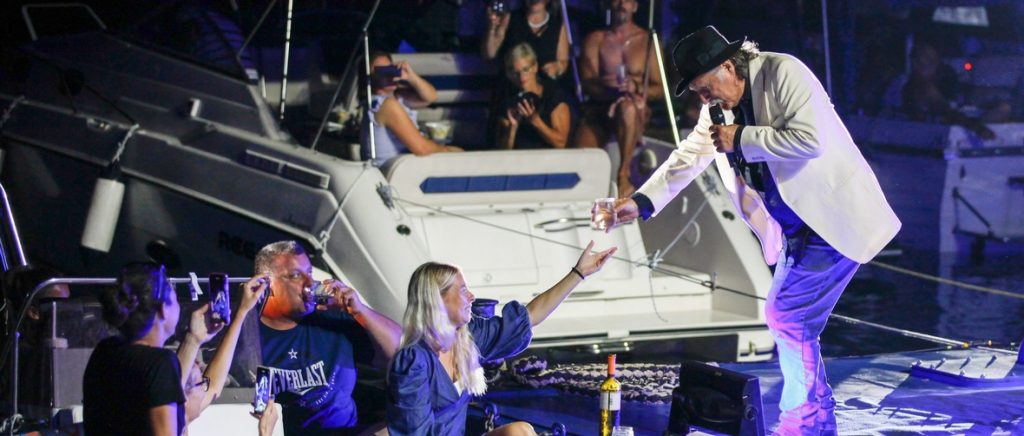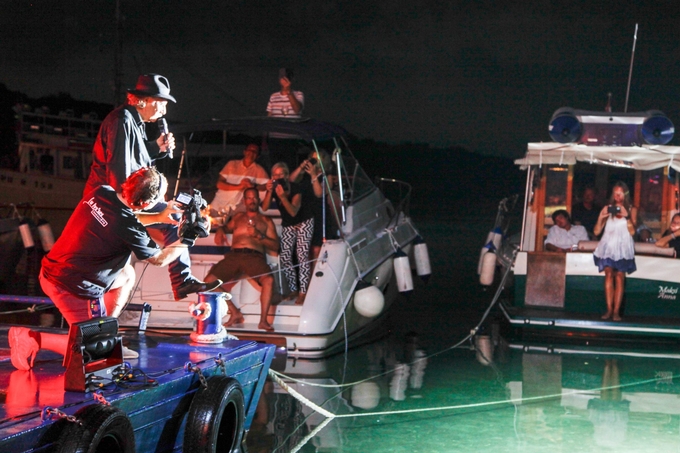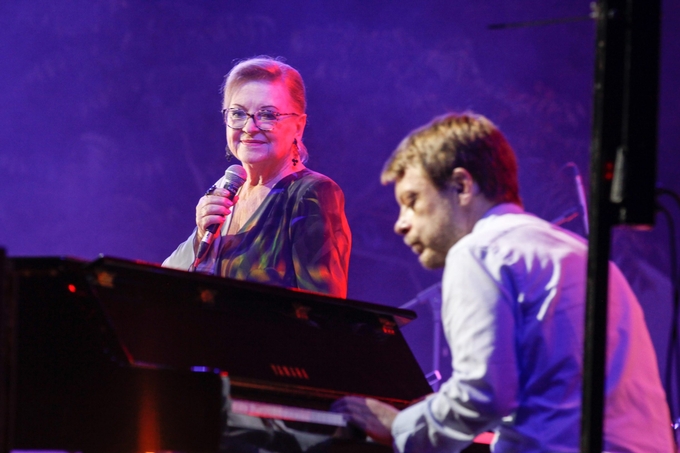Everything is unpretentious on the island and a bit dilapidated, but with a charm that comes from an unusual mixture of Austro-Hungarian and socialist allure, which is a direct consequence of Kupelwieser’s 20 and Tito’s 30 years spent on the Brioni islands – the two la belle epoque archipelagos. Everything before, after and in between did not have the same splendour.

It’s midnight on a dock in the Sveti Nikola bay on the island of Mali Brion. Acting like a caring father, Duško Ljuština, is walking from boat to boat – from the big one with 300 people that sails to Fažana and small speedboats to yachts that transport VIP guests to the Neptun Hotel on the island of Veliki Brion. “Put those ropes away, someone will trip over and fall into the sea!” Duško warns. Lidija Udovički, who jumped into the water at her own accord to celebrate the 20th birthday of the festival created by her talented sister Lenka, swam to the dock, hugged Duško and, glowing in the light of the midnight moon, said: “The past 20 years would not have been possible without him!” Responsible, moral, but also a jokester from Lika, who is still using the age-old expressions of people from Lika that I only heard my mother-in-law use and nobody else, Duško has been masterfully leading the Ulysses Festival for 20 years, just like he had managed the Kerempuh Theatre (formerly Jazavac) in Zagreb for almost three decades.
Three years ago. on Ulysses’ terrace, I watched him how he welcomed Ivan Todorić, the heir of the then bankrupt Agrokor and a former sponsor of the festival, and his wife Milica. The young Todorić, whose company they had longed for only a couple of years earlier, was shunned in Zagreb at that time, but Ljuština welcomed him with the same attention as he welcomed all the current festival patrons or Vanessa Redgrave or non-VIP guests.

A couple of hours earlier, I disembarked from a ship that was transporting passengers from Fažana to the Brioni. As always, we were seated in the outdoor area of the Neptun Hotel and we ordered cheese from Pag and the Malvasia wine. Just as we were about to finish off the second bottle, Joely Kim Richardson, a Hollywood actress known to our audience as Julia from the series Nip/Tuck, came in, riding a bike. Joely is the daughter of Vanessa Redgrave, a great friend of Rade Šerbedžija and the Ulysses Festival, and the sister of actress Natasha Richardson, the late wife of Liam Neeson, who tragically died on a skiing trip in 2009. Joely, who looks as if she hasn’t aged a year since the filming of Nip/Tuck in 2003, greets everybody with an elbow ‘hello’ in accordance with the practice imposed by the “new normal”. She came instead of her mother, who does not travel during the pandemic due to her age.
By the way, Croatia is the first choice for summer vacation for many people from Serbia this year, since Croatia doesn’t have such strict entry rules compared to Greece, Bulgaria or Montenegro. All you need is a negative PCR test or a written confirmation that you will be accommodated for 14 days (in other words, you will spend two weeks in quarantine). Rovinj, the Brioni and the whole of Istria are full of tourists from Serbia. I saw them everywhere I went.
Oliver Dragojević’s song “Cesarica” plays on the terrace of the Neptun Hotel located on the other side of the harbour on the Veliki Brion. My room at the Karmen Hotel doesn’t have air conditioning but it has one of the best views of the Mediterranean. Once the clouds started casting a shadow over the harbour, the scene reminded me of the lyrics of the famous Šerbedžija’s song, written by Arsen Dedić – “Lead-gray sea and pine-coloured sky…”
“Shortly after the war, in 1947, Josip Broz Tito set foot on the Brioni for the first time, and that will pave the path for the new history of the archipelago; even more spectacular than the one from the Art Nouveau era”
The Austro-Hungarian industrialist, Paul Kupelwieser, built the hotel in 1913. In 1893, he bought the entire archipelago with a plan to develop tourism there. Kupelwieser’s approach to implementing this plan was stern and typically German. To combat malaria, he turned to the famous bacteriologist Robert Koch, who first sent his associates to the Brioni, and then came the islands himself. According to their instructions, all ponds, which were home to mosquitoes that were the main malaria carriers, were covered in dirt, and patients were treated with quinine. The disease was eradicated in only one year.
After this successful endeavour, the construction of big hotels commenced. By 1913, four hotels with 320 beds and a dozen villas were built. In 1908, the islands got running water from the mainland. The islands were also advertised as a climatic health resort, and since 1910, they also had their own weekly called Brioni-Inselzeitung. The beautiful building in the harbour called The House for Boats, built in the Art Nouveau style, was home to a local doctor back in the day, while today it houses a small museum where we learned about many famous guests that vacationed on the Brioni – the Romanian King Michael, painter Gustav Klimt, inventor Guglielmo Marconi, Archduke Franz Ferdinand, writers James Joyce and Thomas Mann, composer Richard Strauss…
Shortly after the war, in 1947, Josip Broz Tito set foot on the Brioni for the first time, and that paved the path for the new history of the archipelago; even more spectacular than the one from the Art Nouveau era. In 1949, the Brioni was Tito’s designated island residence. Here, as a host and statesman, he received 53 heads of states and political parties, even more, prime ministers, government ministers and foreign delegations – from Queen Elizabeth II through Gaddafi, Khrushchev and Gorbachev to the Ethiopian Emperor Haile Selassie, from Elizabeth Taylor and Richard Barton through to Sophia Loren to Gina Lollobrigida. During those thirty years, especially in the last decade before Tito’s death, it seemed that the entire planet came to call on the President of Yugoslavia. The exhibition called “Tito on the Brioni” is also dedicated to this epoch. After seeing the exhibition, one can deduce that all the states that emerged from the disintegration of Yugoslavia will never succeed in having even a small part of the international reputation and prestige that Tito secured for the Socialist Federal Republic of Yugoslavia (SFRY). Tito’s 5.6-metre-long Eldorado Cadilac from 1953 is parked in front of the museum.

As in previous years, the reason why I came to the Brioni again was the famous festival Ulysses which a couple of artists and spouses Lenka Udovički and Rade Šerbedžija have been organizing for 20 years under the masterful baton of the aforementioned Duško Ljuština. In the year when the Pula Film Festival and the festivals in Motovo and Grožnjan were cancelled, Šerbedžija’s festival on the Brioni is the only such event that took place. The concert in honour of the festival’s 20th birthday was held in a rather unusual way – the stage was on the island while the audience watched the programme from the boats in front. In addition to the hosts, Gabi Novak, Vlatko Stefanovski, Damir Urban, Darko Rundek and Matija Dedić also performed at the concert. Actors and directors who have participated in the festival over the last 20 years spoke via video messages, and there was a particularly emotional segment that was dedicated to actors and film workers who are no longer with us, including Nebojša Glogovac who starred in the play “A Drunk November Night in 1918”.
“Rovinj, the Brioni and the whole of Istria are full of tourists from Serbia. I saw them everywhere I went”
The concert lasted the perfect two and a half hours and everything went smoothly except when two girls in bathing suits on a yacht nearby started talking so loudly (as a result of the content of their glasses) during Rade’s recital of the famous poem “Ne Daj Se Ines” that we felt tempted to throw them in the sea.
The Brioni is a national park and all facilities on it are owned by the state, which has had many negative but also several extraordinary positive effects. There are no cars on the island, everything is kind of frozen in time, as if you were back in 1983, during breakfast the hotel pianist plays classical melodies on the terrace, there are no bars with loud music, and no “drunk Englishmen” and “arrogant Russians” as elsewhere across the Adriatic – just nice people including a lot from Belgrade. My room has WiFi only on the terrace and occasionally, you can ‘steal’ the Internet from one of the yachts that are anchored a few metres away.
Everything here is unpretentious and a bit dilapidated, but with a charm that comes from an unusual mixture of Austro-Hungarian and socialist allure, which is a direct consequence of Kupelwieser’s 20 and Tito’s 30 years spent on the Brioni islands – the two la belle epoque archipelagos. Everything before, after and in between did not have the same splendour.